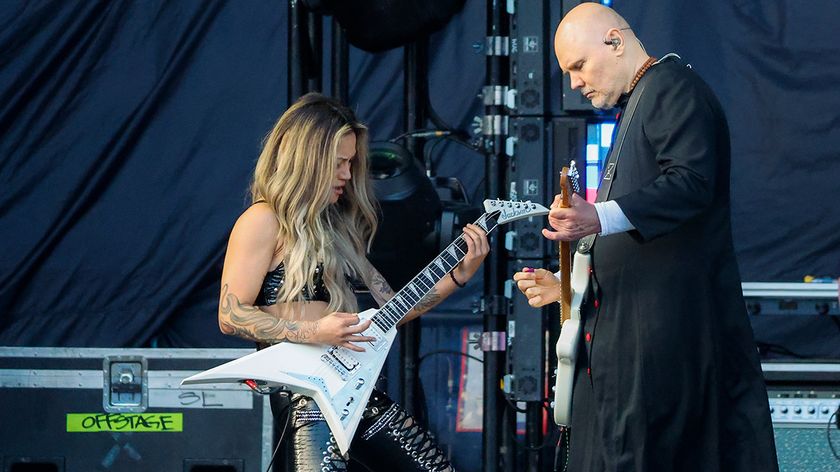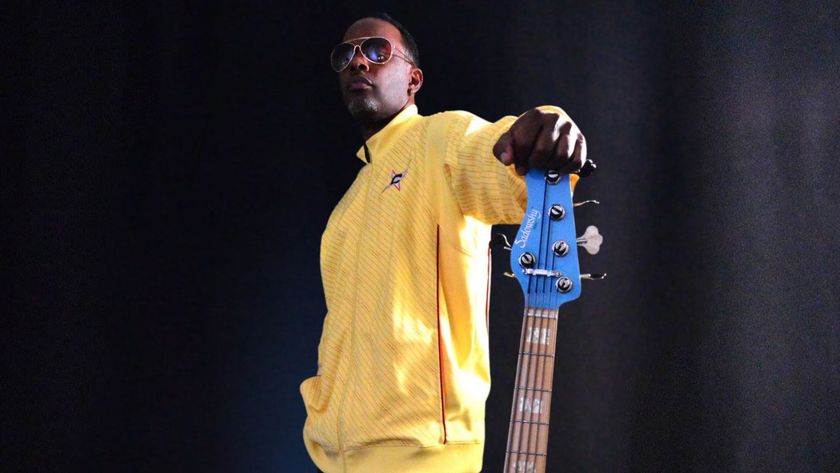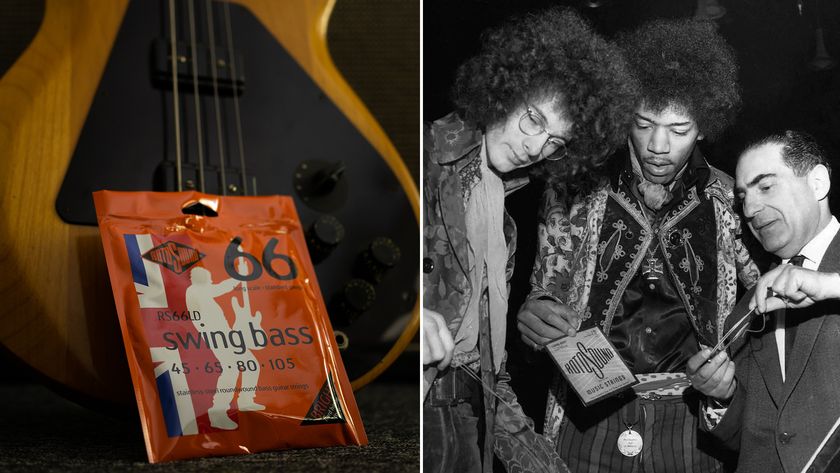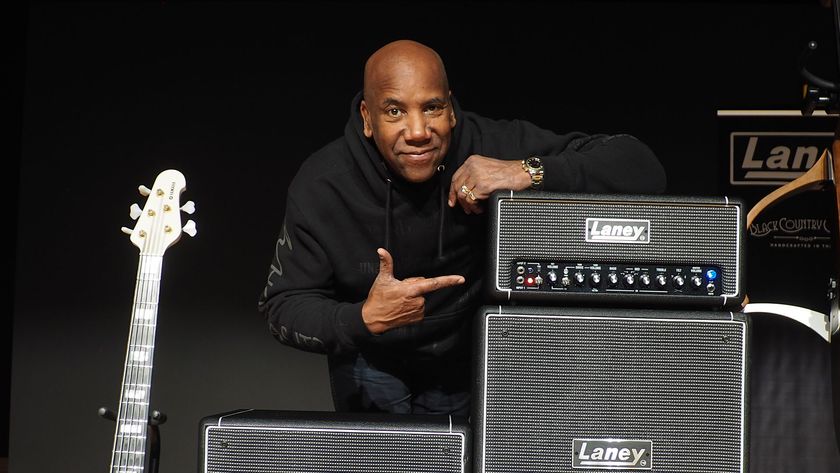Interview: Invadür Guitarist Sean Haidul Talks Gear, Analog Recording and Influences

Massachusetts-based hard rock/heavy metal band Ivadür, which got its start in 2011, released an impressive debut album earlier this year.
This band’s simple goal is to play the kind of music they enjoy listening to, and their passion for all things classic is pretty clear when you listen to this album, which is — through and through — a 100 percent analog recording.
I first interviewed drummer Scott Smith to discuss some basics about the band, and you can read that right here. Then I spoke to guitarist Sean Haidul to find out more about gear and the recording process, among other things. Read our conversation below, and check out Invadür on bandcamp and Facebook.
GUITAR WORLD: In terms of your own setup, what gear did you use for this album?
For this recording I used my Gibson SG Supreme. That’s my ultimate. It’s an emerald burst with gold inlays, and it’s kind of like my baby. I’ve got a couple of extras, but that’s the one I use. And as far as amps, we used Soldano. Scott being the drummer is a giant gear head when it comes to all that stuff. And yeah, nothing really crazy with any of the effects or anything, we just tried to keep it simple and that’s kind of how we went with it. Of course, my SG is the one that’s most important to me, I think [laughs].
You guys recorded the album the analog way. Did that make any difference to your setup, or did you just use the same thing as you would have normally used?
We used the same, man. The only pedal I used was my Dunlop MXR Carbon Copy, which is for the analog delay. There’s a little bit of that, and we did a bit of tweaking in the post-production. But that’s really it as far as that stuff is concerned. It was definitely recorded in 100 percent analog, which I don’t think any of us have done before. We were thinking back on all the old stuff we grew up on. We’re big fans of the classic stuff, and there’s no mistakes made on those albums. So we played seven songs over and over again in the studio, until we got really good at recording them. That was an awesome and challenging experience for us, especially for me. We’d love to do that again, and that’s certainly the plan for upcoming recordings with Invadür.
Get The Pick Newsletter
All the latest guitar news, interviews, lessons, reviews, deals and more, direct to your inbox!
Scott said the whole recording was done within five or six days. In terms of playing the songs over and over again, how many times did you actually play them?
The first day of recording was drum, bass and guitar. We were all locked in one room with all the amps put to one side. I got to do the overdubs because I’m the guitarist, but basically first we had to make sure these tracks had solid bass and drums, and some of the songs we even played 20 times each, just small parts. One miss, and it’s all over! We had to start all over again. As frustrating as it could be sometimes, it was definitely a great experience. It made us a hell of a lot tighter in no time, too. But it’s part of the gig!
In terms of your guitar playing, who has inspired you over the years?
If I had to go to anything, I would seek out Megadeth and Iron Maiden. As much as Dave Mustaine can be a knucklehead, the guy musician-wise has done some of the greatest things I’ve ever heard. Maiden and Adrian Smith are big influences to me as well. Mercyful Fate, K.K. Downing of Judas Priest as well, and we can go on forever with this stuff. But I’ve always been a fan of the early '80s thrash and heavy metal. That’s the stuff that moved me the most.
You mentioned the Gibson SG. Why that guitar? Did you see anybody else using it?
It’s actually funny because I’ve been a self-taught guitarist my whole life. I’ve mostly learned from tablature. Megadeth’s Rust In Peace was one of the first albums I tried to learn. But a really close friend of mine, who’s a guitar teacher, always played Gibson. He’s got tons of Gibson guitars. I would go to him, he would teach me some stuff and I would play his guitars. SG just seemed to be the fit for me, especially for the classic sounding thing we were trying to do. It just made more sense to use that.
Over the years, have you been the kind of guy who practices and spends a lot of time on the guitar, or is it more spontaneous?
Well, I used to practice a lot. I would play some Maiden, Megadeth, Metallica and even the first couple of Queensrÿche albums. Then I started joining bands, and as I got older (I’m 30), I kind of played when I felt like it. I don’t pick up the guitar every day, and instead I do it just a couple of times a week just to see what I have. Especially now, I really believe that I have to feel it to come up with something that’s creative enough. When I pick it up, I just practice some scales, and I try to come up with a riff that I’m into, you know. That’s kind of really where I’m at in terms of guitar playing in my life.
I believe you’re also in a black metal band with Scott. Can you tell me more about that?
The band is just a two-man project called Plagues. We did our first demo and put it out ourselves. There are probably 10 more songs we’re getting ready to record at the end of the summer. Basically heavy metal, black metal and punk hardcore is the music I grew up on, but the intensity of black metal is something I’ve always loved.
I've heard that you and Scott wrote music for this two-man project, but those song didn’t fit in with the project's style so you started Invadür. Is this the sort of band you've always had in the back of your head — a classic heavy band?
Yeah, I think so. When you’re young and are a guitar player at any level, you try to reinvent the wheel. You try to do something special. But through the bands that I’ve done, at some point I just felt like playing what I enjoy. Play what’s fun to you and play what you listen to. I think with Invadür, that’s kind of the riffs we did. I would totally listen to that. It reminded me of stuff I loved to listen to! We shared a love for Mercyful Fate, Maiden and stuff, and as much as I love black metal, sometimes it’s draining and too intense. I was kind of like, "You know, let’s mess around with something else here." So we did and had a blast. It was too fun and too easy to just not do. We started putting it together, got a singer and bass player, and here we are! It’s been probably one of the most enjoyable recording and band experiences I’ve ever had.
How are you going forward? Will you be working both the black metal project and Invadür?
Believe it or not, it’s actually easier than it sounds because they’re so different. From the minute I wake up to the time I go to bed, it’s easy to channel my influences. With the black metal stuff, I like to play a little bit more melodic, but I feel I have to express different feelings for both, as weird as it sounds. I always try to be active in music, because that’s just what I do. It’s definitely something I plan on doing for a long time, one way or another.
Andrew Bansal is a writer who has been running his own website, Metal Assault, since early 2010, and has been prolific in covering the hard rock and heavy metal scene by posting interviews, news, reviews and pictures on his website — with the help of a small group of people. He briefly moved away from the Los Angeles scene and explored metal in India, but he is now back in LA continuing from where he left off.



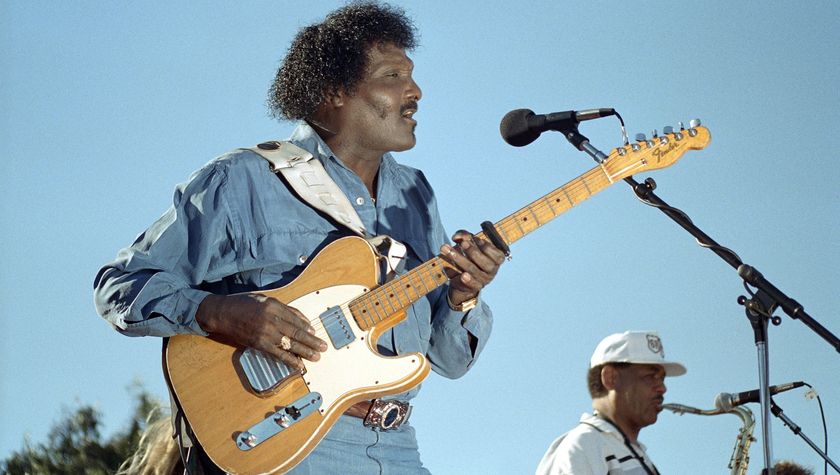
“Freddie King would ask me why I never tried using thumbpicks – I just couldn't play with one”: He took Jimi Hendrix's place in Little Richard's band, was idolized by Stevie Ray Vaughan, and is one of the most overlooked Telecaster slingers of all time

“If any song can unite all generations of rock guitar fans, this is it”: March 2025 Guitar World Editors' Picks
